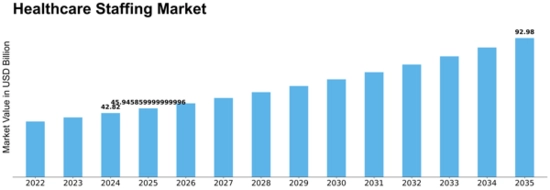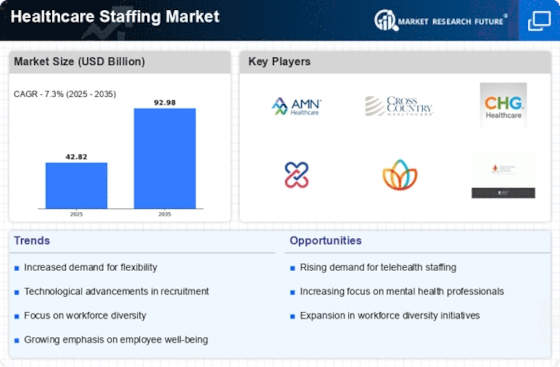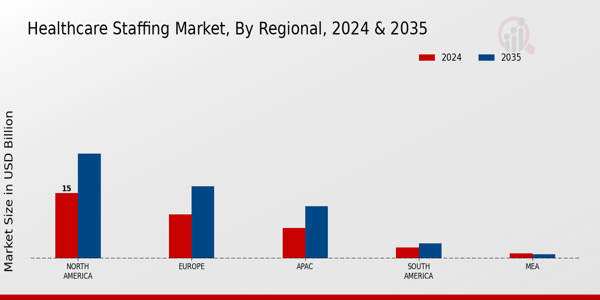Temporary Staffing
Permanent Staffing
Travel Nursing
Locum Tenens
Hospitals
Clinics
Long-Term Care Facilities
Home Healthcare
Nursing
Allied Health
Physician Staffing
Administrative Staffing
Managed Services Provider
Recruitment Process Outsourcing
Contingent Workforce
North America
Europe
South America
Asia Pacific
Middle East and Africa
North America Outlook (USD Billion, 2019-2035)
North America Healthcare Staffing Market by Service Type
Temporary Staffing
Permanent Staffing
Travel Nursing
Locum Tenens
North America Healthcare Staffing Market by End User Type
Hospitals
Clinics
Long-Term Care Facilities
Home Healthcare
North America Healthcare Staffing Market by Healthcare Sector Type
Nursing
Allied Health
Physician Staffing
Administrative Staffing
North America Healthcare Staffing Market by Staffing Model Type
Managed Services Provider
Recruitment Process Outsourcing
Contingent Workforce
North America Healthcare Staffing Market by Regional Type
US
Canada
US Outlook (USD Billion, 2019-2035)
US Healthcare Staffing Market by Service Type
Temporary Staffing
Permanent Staffing
Travel Nursing
Locum Tenens
US Healthcare Staffing Market by End User Type
Hospitals
Clinics
Long-Term Care Facilities
Home Healthcare
US Healthcare Staffing Market by Healthcare Sector Type
Nursing
Allied Health
Physician Staffing
Administrative Staffing
US Healthcare Staffing Market by Staffing Model Type
Managed Services Provider
Recruitment Process Outsourcing
Contingent Workforce
CANADA Outlook (USD Billion, 2019-2035)
CANADA Healthcare Staffing Market by Service Type
Temporary Staffing
Permanent Staffing
Travel Nursing
Locum Tenens
CANADA Healthcare Staffing Market by End User Type
Hospitals
Clinics
Long-Term Care Facilities
Home Healthcare
CANADA Healthcare Staffing Market by Healthcare Sector Type
Nursing
Allied Health
Physician Staffing
Administrative Staffing
CANADA Healthcare Staffing Market by Staffing Model Type
Managed Services Provider
Recruitment Process Outsourcing
Contingent Workforce
Europe Outlook (USD Billion, 2019-2035)
Europe Healthcare Staffing Market by Service Type
Temporary Staffing
Permanent Staffing
Travel Nursing
Locum Tenens
Europe Healthcare Staffing Market by End User Type
Hospitals
Clinics
Long-Term Care Facilities
Home Healthcare
Europe Healthcare Staffing Market by Healthcare Sector Type
Nursing
Allied Health
Physician Staffing
Administrative Staffing
Europe Healthcare Staffing Market by Staffing Model Type
Managed Services Provider
Recruitment Process Outsourcing
Contingent Workforce
Europe Healthcare Staffing Market by Regional Type
Germany
UK
France
Russia
Italy
Spain
Rest of Europe
GERMANY Outlook (USD Billion, 2019-2035)
GERMANY Healthcare Staffing Market by Service Type
Temporary Staffing
Permanent Staffing
Travel Nursing
Locum Tenens
GERMANY Healthcare Staffing Market by End User Type
Hospitals
Clinics
Long-Term Care Facilities
Home Healthcare
GERMANY Healthcare Staffing Market by Healthcare Sector Type
Nursing
Allied Health
Physician Staffing
Administrative Staffing
GERMANY Healthcare Staffing Market by Staffing Model Type
Managed Services Provider
Recruitment Process Outsourcing
Contingent Workforce
UK Outlook (USD Billion, 2019-2035)
UK Healthcare Staffing Market by Service Type
Temporary Staffing
Permanent Staffing
Travel Nursing
Locum Tenens
UK Healthcare Staffing Market by End User Type
Hospitals
Clinics
Long-Term Care Facilities
Home Healthcare
UK Healthcare Staffing Market by Healthcare Sector Type
Nursing
Allied Health
Physician Staffing
Administrative Staffing
UK Healthcare Staffing Market by Staffing Model Type
Managed Services Provider
Recruitment Process Outsourcing
Contingent Workforce
FRANCE Outlook (USD Billion, 2019-2035)
FRANCE Healthcare Staffing Market by Service Type
Temporary Staffing
Permanent Staffing
Travel Nursing
Locum Tenens
FRANCE Healthcare Staffing Market by End User Type
Hospitals
Clinics
Long-Term Care Facilities
Home Healthcare
FRANCE Healthcare Staffing Market by Healthcare Sector Type
Nursing
Allied Health
Physician Staffing
Administrative Staffing
FRANCE Healthcare Staffing Market by Staffing Model Type
Managed Services Provider
Recruitment Process Outsourcing
Contingent Workforce
RUSSIA Outlook (USD Billion, 2019-2035)
RUSSIA Healthcare Staffing Market by Service Type
Temporary Staffing
Permanent Staffing
Travel Nursing
Locum Tenens
RUSSIA Healthcare Staffing Market by End User Type
Hospitals
Clinics
Long-Term Care Facilities
Home Healthcare
RUSSIA Healthcare Staffing Market by Healthcare Sector Type
Nursing
Allied Health
Physician Staffing
Administrative Staffing
RUSSIA Healthcare Staffing Market by Staffing Model Type
Managed Services Provider
Recruitment Process Outsourcing
Contingent Workforce
ITALY Outlook (USD Billion, 2019-2035)
ITALY Healthcare Staffing Market by Service Type
Temporary Staffing
Permanent Staffing
Travel Nursing
Locum Tenens
ITALY Healthcare Staffing Market by End User Type
Hospitals
Clinics
Long-Term Care Facilities
Home Healthcare
ITALY Healthcare Staffing Market by Healthcare Sector Type
Nursing
Allied Health
Physician Staffing
Administrative Staffing
ITALY Healthcare Staffing Market by Staffing Model Type
Managed Services Provider
Recruitment Process Outsourcing
Contingent Workforce
SPAIN Outlook (USD Billion, 2019-2035)
SPAIN Healthcare Staffing Market by Service Type
Temporary Staffing
Permanent Staffing
Travel Nursing
Locum Tenens
SPAIN Healthcare Staffing Market by End User Type
Hospitals
Clinics
Long-Term Care Facilities
Home Healthcare
SPAIN Healthcare Staffing Market by Healthcare Sector Type
Nursing
Allied Health
Physician Staffing
Administrative Staffing
SPAIN Healthcare Staffing Market by Staffing Model Type
Managed Services Provider
Recruitment Process Outsourcing
Contingent Workforce
REST OF EUROPE Outlook (USD Billion, 2019-2035)
REST OF EUROPE Healthcare Staffing Market by Service Type
Temporary Staffing
Permanent Staffing
Travel Nursing
Locum Tenens
REST OF EUROPE Healthcare Staffing Market by End User Type
Hospitals
Clinics
Long-Term Care Facilities
Home Healthcare
REST OF EUROPE Healthcare Staffing Market by Healthcare Sector Type
Nursing
Allied Health
Physician Staffing
Administrative Staffing
REST OF EUROPE Healthcare Staffing Market by Staffing Model Type
Managed Services Provider
Recruitment Process Outsourcing
Contingent Workforce
APAC Outlook (USD Billion, 2019-2035)
APAC Healthcare Staffing Market by Service Type
Temporary Staffing
Permanent Staffing
Travel Nursing
Locum Tenens
APAC Healthcare Staffing Market by End User Type
Hospitals
Clinics
Long-Term Care Facilities
Home Healthcare
APAC Healthcare Staffing Market by Healthcare Sector Type
Nursing
Allied Health
Physician Staffing
Administrative Staffing
APAC Healthcare Staffing Market by Staffing Model Type
Managed Services Provider
Recruitment Process Outsourcing
Contingent Workforce
APAC Healthcare Staffing Market by Regional Type
China
India
Japan
South Korea
Malaysia
Thailand
Indonesia
Rest of APAC
CHINA Outlook (USD Billion, 2019-2035)
CHINA Healthcare Staffing Market by Service Type
Temporary Staffing
Permanent Staffing
Travel Nursing
Locum Tenens
CHINA Healthcare Staffing Market by End User Type
Hospitals
Clinics
Long-Term Care Facilities
Home Healthcare
CHINA Healthcare Staffing Market by Healthcare Sector Type
Nursing
Allied Health
Physician Staffing
Administrative Staffing
CHINA Healthcare Staffing Market by Staffing Model Type
Managed Services Provider
Recruitment Process Outsourcing
Contingent Workforce
INDIA Outlook (USD Billion, 2019-2035)
INDIA Healthcare Staffing Market by Service Type
Temporary Staffing
Permanent Staffing
Travel Nursing
Locum Tenens
INDIA Healthcare Staffing Market by End User Type
Hospitals
Clinics
Long-Term Care Facilities
Home Healthcare
INDIA Healthcare Staffing Market by Healthcare Sector Type
Nursing
Allied Health
Physician Staffing
Administrative Staffing
INDIA Healthcare Staffing Market by Staffing Model Type
Managed Services Provider
Recruitment Process Outsourcing
Contingent Workforce
JAPAN Outlook (USD Billion, 2019-2035)
JAPAN Healthcare Staffing Market by Service Type
Temporary Staffing
Permanent Staffing
Travel Nursing
Locum Tenens
JAPAN Healthcare Staffing Market by End User Type
Hospitals
Clinics
Long-Term Care Facilities
Home Healthcare
JAPAN Healthcare Staffing Market by Healthcare Sector Type
Nursing
Allied Health
Physician Staffing
Administrative Staffing
JAPAN Healthcare Staffing Market by Staffing Model Type
Managed Services Provider
Recruitment Process Outsourcing
Contingent Workforce
SOUTH KOREA Outlook (USD Billion, 2019-2035)
SOUTH KOREA Healthcare Staffing Market by Service Type
Temporary Staffing
Permanent Staffing
Travel Nursing
Locum Tenens
SOUTH KOREA Healthcare Staffing Market by End User Type
Hospitals
Clinics
Long-Term Care Facilities
Home Healthcare
SOUTH KOREA Healthcare Staffing Market by Healthcare Sector Type
Nursing
Allied Health
Physician Staffing
Administrative Staffing
SOUTH KOREA Healthcare Staffing Market by Staffing Model Type
Managed Services Provider
Recruitment Process Outsourcing
Contingent Workforce
MALAYSIA Outlook (USD Billion, 2019-2035)
MALAYSIA Healthcare Staffing Market by Service Type
Temporary Staffing
Permanent Staffing
Travel Nursing
Locum Tenens
MALAYSIA Healthcare Staffing Market by End User Type
Hospitals
Clinics
Long-Term Care Facilities
Home Healthcare
MALAYSIA Healthcare Staffing Market by Healthcare Sector Type
Nursing
Allied Health
Physician Staffing
Administrative Staffing
MALAYSIA Healthcare Staffing Market by Staffing Model Type
Managed Services Provider
Recruitment Process Outsourcing
Contingent Workforce
THAILAND Outlook (USD Billion, 2019-2035)
THAILAND Healthcare Staffing Market by Service Type
Temporary Staffing
Permanent Staffing
Travel Nursing
Locum Tenens
THAILAND Healthcare Staffing Market by End User Type
Hospitals
Clinics
Long-Term Care Facilities
Home Healthcare
THAILAND Healthcare Staffing Market by Healthcare Sector Type
Nursing
Allied Health
Physician Staffing
Administrative Staffing
THAILAND Healthcare Staffing Market by Staffing Model Type
Managed Services Provider
Recruitment Process Outsourcing
Contingent Workforce
INDONESIA Outlook (USD Billion, 2019-2035)
INDONESIA Healthcare Staffing Market by Service Type
Temporary Staffing
Permanent Staffing
Travel Nursing
Locum Tenens
INDONESIA Healthcare Staffing Market by End User Type
Hospitals
Clinics
Long-Term Care Facilities
Home Healthcare
INDONESIA Healthcare Staffing Market by Healthcare Sector Type
Nursing
Allied Health
Physician Staffing
Administrative Staffing
INDONESIA Healthcare Staffing Market by Staffing Model Type
Managed Services Provider
Recruitment Process Outsourcing
Contingent Workforce
REST OF APAC Outlook (USD Billion, 2019-2035)
REST OF APAC Healthcare Staffing Market by Service Type
Temporary Staffing
Permanent Staffing
Travel Nursing
Locum Tenens
REST OF APAC Healthcare Staffing Market by End User Type
Hospitals
Clinics
Long-Term Care Facilities
Home Healthcare
REST OF APAC Healthcare Staffing Market by Healthcare Sector Type
Nursing
Allied Health
Physician Staffing
Administrative Staffing
REST OF APAC Healthcare Staffing Market by Staffing Model Type
Managed Services Provider
Recruitment Process Outsourcing
Contingent Workforce
South America Outlook (USD Billion, 2019-2035)
South America Healthcare Staffing Market by Service Type
Temporary Staffing
Permanent Staffing
Travel Nursing
Locum Tenens
South America Healthcare Staffing Market by End User Type
Hospitals
Clinics
Long-Term Care Facilities
Home Healthcare
South America Healthcare Staffing Market by Healthcare Sector Type
Nursing
Allied Health
Physician Staffing
Administrative Staffing
South America Healthcare Staffing Market by Staffing Model Type
Managed Services Provider
Recruitment Process Outsourcing
Contingent Workforce
South America Healthcare Staffing Market by Regional Type
Brazil
Mexico
Argentina
Rest of South America
BRAZIL Outlook (USD Billion, 2019-2035)
BRAZIL Healthcare Staffing Market by Service Type
Temporary Staffing
Permanent Staffing
Travel Nursing
Locum Tenens
BRAZIL Healthcare Staffing Market by End User Type
Hospitals
Clinics
Long-Term Care Facilities
Home Healthcare
BRAZIL Healthcare Staffing Market by Healthcare Sector Type
Nursing
Allied Health
Physician Staffing
Administrative Staffing
BRAZIL Healthcare Staffing Market by Staffing Model Type
Managed Services Provider
Recruitment Process Outsourcing
Contingent Workforce
MEXICO Outlook (USD Billion, 2019-2035)
MEXICO Healthcare Staffing Market by Service Type
Temporary Staffing
Permanent Staffing
Travel Nursing
Locum Tenens
MEXICO Healthcare Staffing Market by End User Type
Hospitals
Clinics
Long-Term Care Facilities
Home Healthcare
MEXICO Healthcare Staffing Market by Healthcare Sector Type
Nursing
Allied Health
Physician Staffing
Administrative Staffing
MEXICO Healthcare Staffing Market by Staffing Model Type
Managed Services Provider
Recruitment Process Outsourcing
Contingent Workforce
ARGENTINA Outlook (USD Billion, 2019-2035)
ARGENTINA Healthcare Staffing Market by Service Type
Temporary Staffing
Permanent Staffing
Travel Nursing
Locum Tenens
ARGENTINA Healthcare Staffing Market by End User Type
Hospitals
Clinics
Long-Term Care Facilities
Home Healthcare
ARGENTINA Healthcare Staffing Market by Healthcare Sector Type
Nursing
Allied Health
Physician Staffing
Administrative Staffing
ARGENTINA Healthcare Staffing Market by Staffing Model Type
Managed Services Provider
Recruitment Process Outsourcing
Contingent Workforce
REST OF SOUTH AMERICA Outlook (USD Billion, 2019-2035)
REST OF SOUTH AMERICA Healthcare Staffing Market by Service Type
Temporary Staffing
Permanent Staffing
Travel Nursing
Locum Tenens
REST OF SOUTH AMERICA Healthcare Staffing Market by End User Type
Hospitals
Clinics
Long-Term Care Facilities
Home Healthcare
REST OF SOUTH AMERICA Healthcare Staffing Market by Healthcare Sector Type
Nursing
Allied Health
Physician Staffing
Administrative Staffing
REST OF SOUTH AMERICA Healthcare Staffing Market by Staffing Model Type
Managed Services Provider
Recruitment Process Outsourcing
Contingent Workforce
MEA Outlook (USD Billion, 2019-2035)
MEA Healthcare Staffing Market by Service Type
Temporary Staffing
Permanent Staffing
Travel Nursing
Locum Tenens
MEA Healthcare Staffing Market by End User Type
Hospitals
Clinics
Long-Term Care Facilities
Home Healthcare
MEA Healthcare Staffing Market by Healthcare Sector Type
Nursing
Allied Health
Physician Staffing
Administrative Staffing
MEA Healthcare Staffing Market by Staffing Model Type
Managed Services Provider
Recruitment Process Outsourcing
Contingent Workforce
MEA Healthcare Staffing Market by Regional Type
GCC Countries
South Africa
Rest of MEA
GCC COUNTRIES Outlook (USD Billion, 2019-2035)
GCC COUNTRIES Healthcare Staffing Market by Service Type
Temporary Staffing
Permanent Staffing
Travel Nursing
Locum Tenens
GCC COUNTRIES Healthcare Staffing Market by End User Type
Hospitals
Clinics
Long-Term Care Facilities
Home Healthcare
GCC COUNTRIES Healthcare Staffing Market by Healthcare Sector Type
Nursing
Allied Health
Physician Staffing
Administrative Staffing
GCC COUNTRIES Healthcare Staffing Market by Staffing Model Type
Managed Services Provider
Recruitment Process Outsourcing
Contingent Workforce
SOUTH AFRICA Outlook (USD Billion, 2019-2035)
SOUTH AFRICA Healthcare Staffing Market by Service Type
Temporary Staffing
Permanent Staffing
Travel Nursing
Locum Tenens
SOUTH AFRICA Healthcare Staffing Market by End User Type
Hospitals
Clinics
Long-Term Care Facilities
Home Healthcare
SOUTH AFRICA Healthcare Staffing Market by Healthcare Sector Type
Nursing
Allied Health
Physician Staffing
Administrative Staffing
SOUTH AFRICA Healthcare Staffing Market by Staffing Model Type
Managed Services Provider
Recruitment Process Outsourcing
Contingent Workforce
REST OF MEA Outlook (USD Billion, 2019-2035)
REST OF MEA Healthcare Staffing Market by Service Type
Temporary Staffing
Permanent Staffing
Travel Nursing
Locum Tenens
REST OF MEA Healthcare Staffing Market by End User Type
Hospitals
Clinics
Long-Term Care Facilities
Home Healthcare
REST OF MEA Healthcare Staffing Market by Healthcare Sector Type
Nursing
Allied Health
Physician Staffing
Administrative Staffing
REST OF MEA Healthcare Staffing Market by Staffing Model Type
Managed Services Provider
Recruitment Process Outsourcing
Contingent Workforce















Leave a Comment